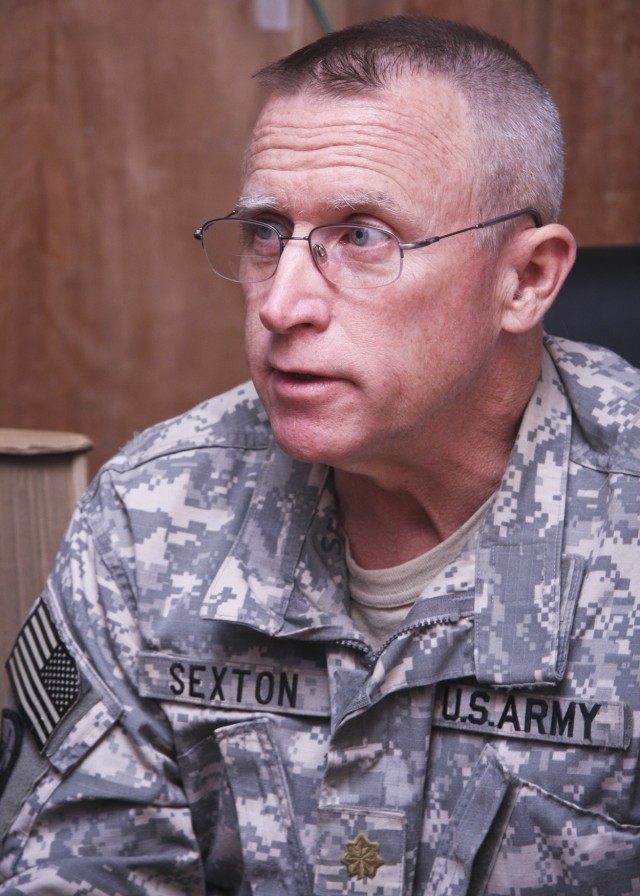BAGHDAD (Army News Service, Jan. 5, 2009) -- Young men and women frequently follow the footsteps of their parents and grandparents by joining the military. Army Maj. (Dr.) Robert Sexton reversed that role when he followed his two sons into the military after a 38-year-break from his previous service.
Sexton was an unlikely candidate when he was commissioned in November 2007 in his mid-50s and assigned to serve as a physician with Headquarters and Headquarters Company, 425th Civil Affairs Battalion, attached to the 4th Infantry Division here.
Sexton enlisted in the Army at 17 and left his native Cleveland in 1968 for Vietnam, where he would spend the next two years attached to the 101st Airborne Division, working with Korean troops on Army boats that provided transport, insertion and evacuation.
Sexton was honorably discharged at 20 and returned home only to become disillusioned with the social upheaval happening in the United States. He and his wife decided to move to her native country of Guatemala.
Sexton worked multiple jobs to support his family in Central America, but eventually decided to realize his desires and go to medical school in Guatemala.
"I had always thought about medical school, but because we were just married and right out of the Army and we had two kids, I had to work two and three jobs all of the time - landscaping, painting houses. There just was no time for studies," Sexton said. "But it had always stuck in the back of my mind, and I don't know why, but we visited a medical school down in Guatemala, and they had an open-door policy."
Sexton said he didn't think he would make it through that first year of medical school because of the language barrier. However, he said, because medical terminology is pretty much the same in every language, especially with the basic sciences, he passed even as his class of more than 1,200 first-year students was thinned to 120.
Sexton finished medical school in Guatemala and gained his residency. He planned on staying there and starting a practice. However, when violence and turmoil spread there, he relocated his family back to the United States in 1981.
Sexton regained his residency and was licensed to practice medicine in several states. Eventually, he ended up in Tucson, Ariz., where he practiced as a neonatologist, a doctor who works in intensive care for newborn babies, and started a private emergency medical practice with a close friend.
Nearly two decades later, Sexton and his family began a transformation of sorts as two of his sons joined the Marine Corps, both at 17.
Their decisions to join the Marines surprised and moved Sexton, he said, because they never talked about the military at home and he thought his children would get through high school and then go on to college. He began to feel the tug of inspiration.
Sexton's third son, who had joined in 1997, was due to get out of the Marines in 2003, but chose to re-enlist. "He insisted on going to Iraq, so he extended himself and went into Iraq on the first wave," he said.
"My two sons inspired me," he said. "Then, two years later, after reading what the Army had done over there, I got more and more inspired with everything I read."
Concluding that the fight against terrorism would be a long one, and feeling he could still make a contribution, Sexton accepted a commission to the Army in November 2007 and has been serving as a doctor in Baghdad since October.
"I figured we have less than 1 percent of the American people in the service, and some of those people are going to need a break sometime - and that's what I aim to do. I'm still physically fit. I thought I could make a contribution," Sexton said.
Sexton's decision to rejoin the Army after a 38-year break in service leaves him little possibility of earning a military retirement because of his age. Still, he said, he derives satisfaction from making a contribution to a noble cause - working with Iraqi forces to bring medical care and training to needy areas in Baghdad.
"He blows us away. He's pushing 60, and he's more physically fit than some of the younger guys here," said Army 1st Sgt. George Guerra, the battalion's senior enlisted leader. "We hardly ever see him because he's always gone doing these combined medical engagements. He's really into his work, and he loves it. He just wants to get out and do this work with the Iraqi people."
Sexton said he finds great satisfaction helping Iraqis by providing them with needed medical care, and he expressed a desire when his tour is over to go to other places with the Army where he can continue his work.
"I'll be going to Afghanistan next year with my old unit," Sexton said. "After Afghanistan, I would like to go to the Horn of Africa, because that's where I think civil affairs probably shines the most. I would like to do tours in Central and South America because of the language, and I wouldn't mind going to the Philippines."
(Sgt. Whitney Houston serves in the Multinational Division Baghdad public affairs office.)


Social Sharing